LAW3130 Taxation Law: Residency, Income, and Government Grant Analysis
VerifiedAdded on 2023/06/07
|18
|5298
|195
Case Study
AI Summary
This assignment presents a case study focused on Australian taxation law, specifically addressing residency, income assessment, and government grants. The first part determines whether an individual, John, is considered an Australian resident under ITAA 1936, examining domicile, the 183-day test, and superannuation fund membership. The second part analyzes the income tax implications for Ed, considering insurance payouts, compensation, and the sale of trading stock and antiques under ITAA 1997. The final part assesses whether a government grant received by a taxpayer is subject to taxation under ITAA 1997, referencing relevant taxation rulings and court cases. The analysis incorporates relevant sections of the ITAA and judicial precedents to reach well-supported conclusions. Desklib provides access to similar solved assignments and study materials for students.
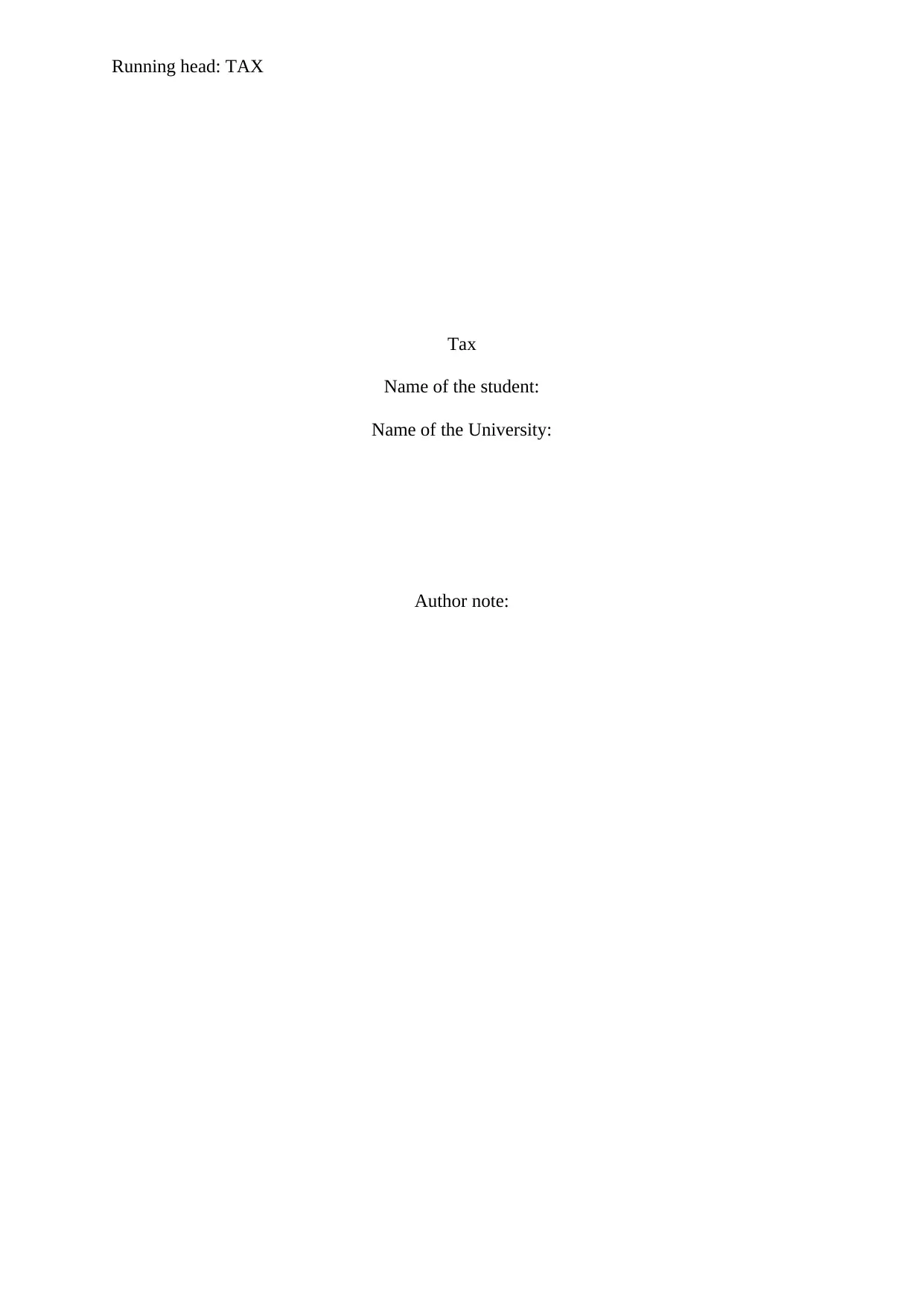
Running head: TAX
Tax
Name of the student:
Name of the University:
Author note:
Tax
Name of the student:
Name of the University:
Author note:
Paraphrase This Document
Need a fresh take? Get an instant paraphrase of this document with our AI Paraphraser
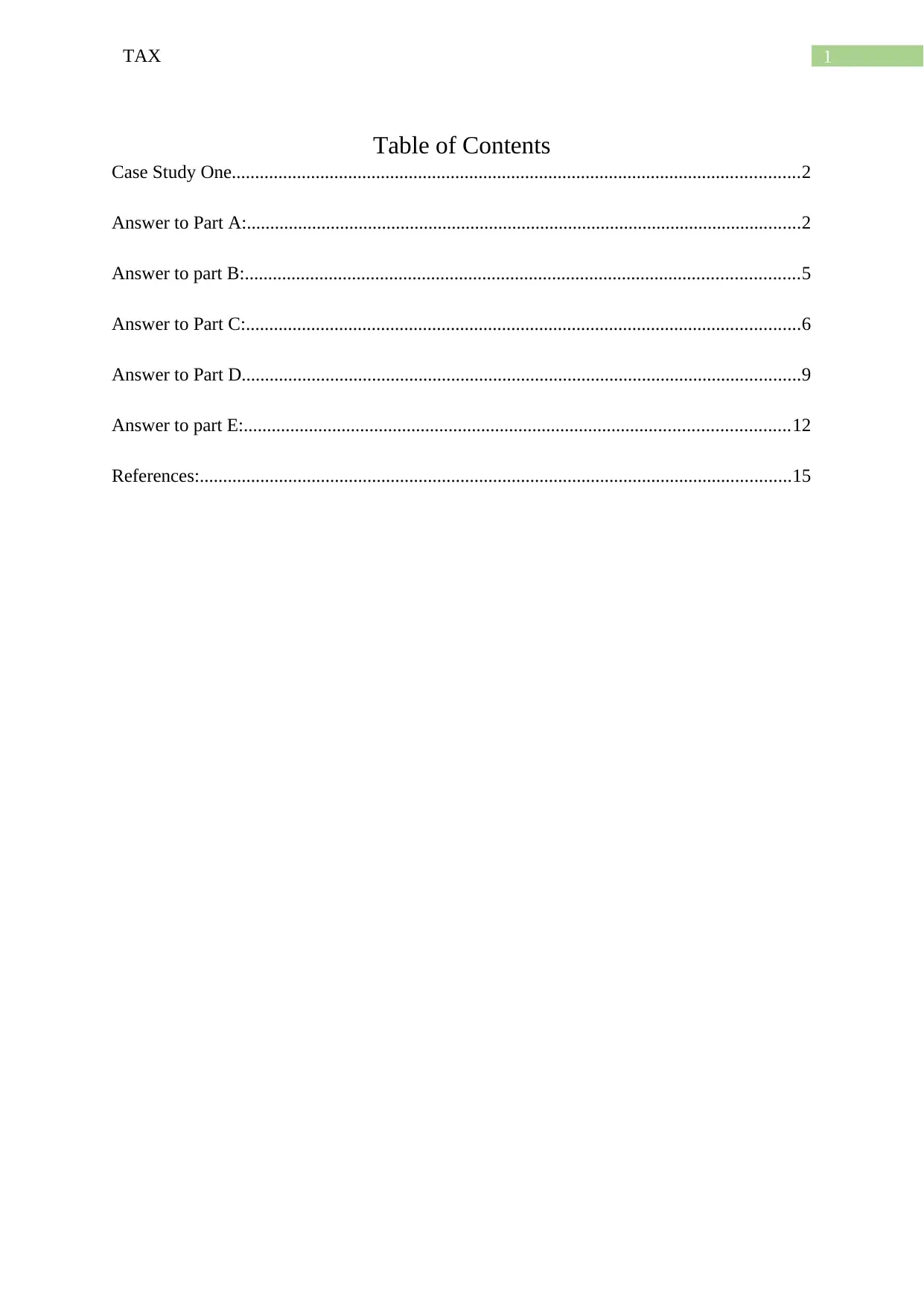
1TAX
Table of Contents
Case Study One..........................................................................................................................2
Answer to Part A:.......................................................................................................................2
Answer to part B:.......................................................................................................................5
Answer to Part C:.......................................................................................................................6
Answer to Part D........................................................................................................................9
Answer to part E:.....................................................................................................................12
References:...............................................................................................................................15
Table of Contents
Case Study One..........................................................................................................................2
Answer to Part A:.......................................................................................................................2
Answer to part B:.......................................................................................................................5
Answer to Part C:.......................................................................................................................6
Answer to Part D........................................................................................................................9
Answer to part E:.....................................................................................................................12
References:...............................................................................................................................15
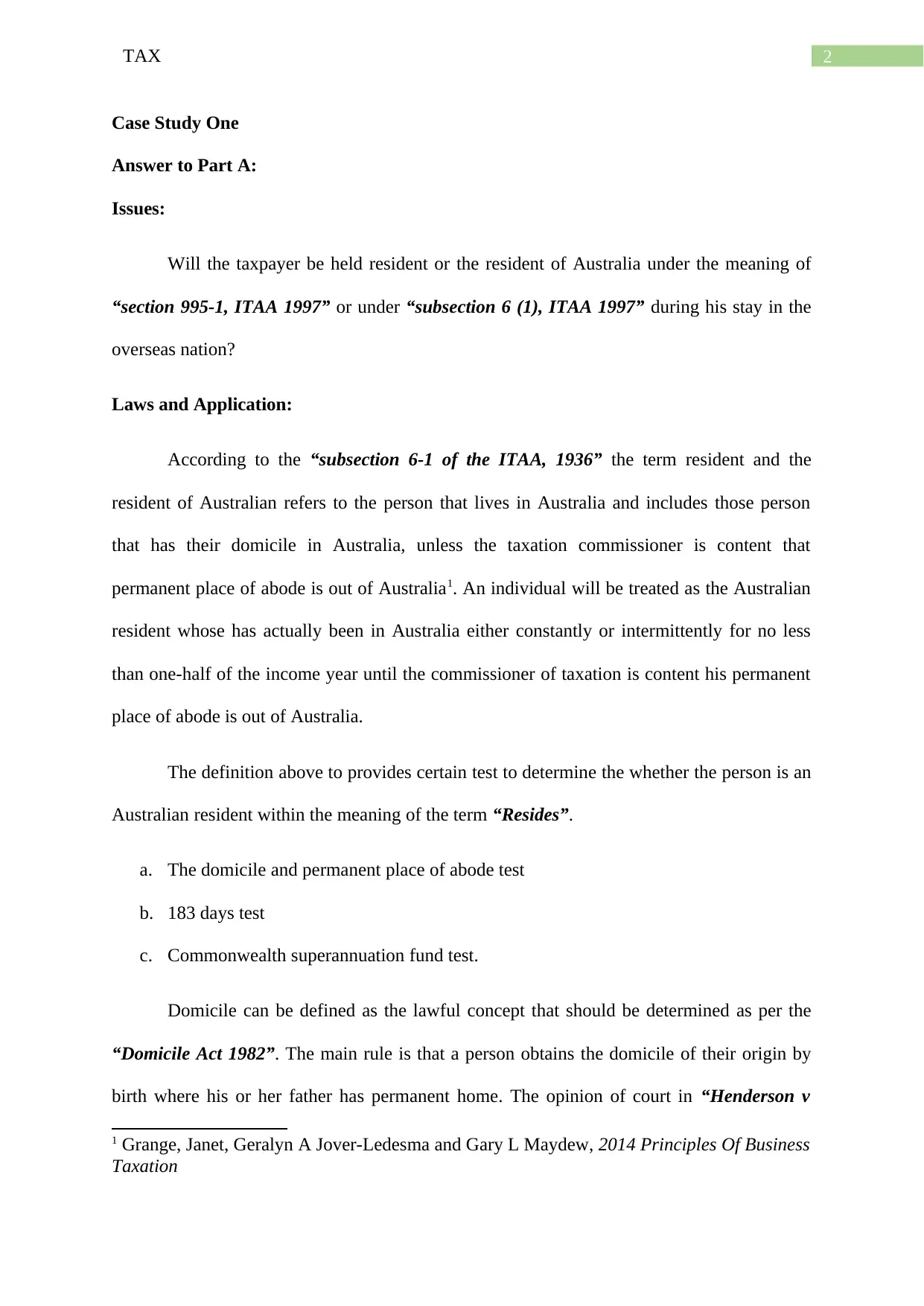
2TAX
Case Study One
Answer to Part A:
Issues:
Will the taxpayer be held resident or the resident of Australia under the meaning of
“section 995-1, ITAA 1997” or under “subsection 6 (1), ITAA 1997” during his stay in the
overseas nation?
Laws and Application:
According to the “subsection 6-1 of the ITAA, 1936” the term resident and the
resident of Australian refers to the person that lives in Australia and includes those person
that has their domicile in Australia, unless the taxation commissioner is content that
permanent place of abode is out of Australia1. An individual will be treated as the Australian
resident whose has actually been in Australia either constantly or intermittently for no less
than one-half of the income year until the commissioner of taxation is content his permanent
place of abode is out of Australia.
The definition above to provides certain test to determine the whether the person is an
Australian resident within the meaning of the term “Resides”.
a. The domicile and permanent place of abode test
b. 183 days test
c. Commonwealth superannuation fund test.
Domicile can be defined as the lawful concept that should be determined as per the
“Domicile Act 1982”. The main rule is that a person obtains the domicile of their origin by
birth where his or her father has permanent home. The opinion of court in “Henderson v
1 Grange, Janet, Geralyn A Jover-Ledesma and Gary L Maydew, 2014 Principles Of Business
Taxation
Case Study One
Answer to Part A:
Issues:
Will the taxpayer be held resident or the resident of Australia under the meaning of
“section 995-1, ITAA 1997” or under “subsection 6 (1), ITAA 1997” during his stay in the
overseas nation?
Laws and Application:
According to the “subsection 6-1 of the ITAA, 1936” the term resident and the
resident of Australian refers to the person that lives in Australia and includes those person
that has their domicile in Australia, unless the taxation commissioner is content that
permanent place of abode is out of Australia1. An individual will be treated as the Australian
resident whose has actually been in Australia either constantly or intermittently for no less
than one-half of the income year until the commissioner of taxation is content his permanent
place of abode is out of Australia.
The definition above to provides certain test to determine the whether the person is an
Australian resident within the meaning of the term “Resides”.
a. The domicile and permanent place of abode test
b. 183 days test
c. Commonwealth superannuation fund test.
Domicile can be defined as the lawful concept that should be determined as per the
“Domicile Act 1982”. The main rule is that a person obtains the domicile of their origin by
birth where his or her father has permanent home. The opinion of court in “Henderson v
1 Grange, Janet, Geralyn A Jover-Ledesma and Gary L Maydew, 2014 Principles Of Business
Taxation
⊘ This is a preview!⊘
Do you want full access?
Subscribe today to unlock all pages.

Trusted by 1+ million students worldwide
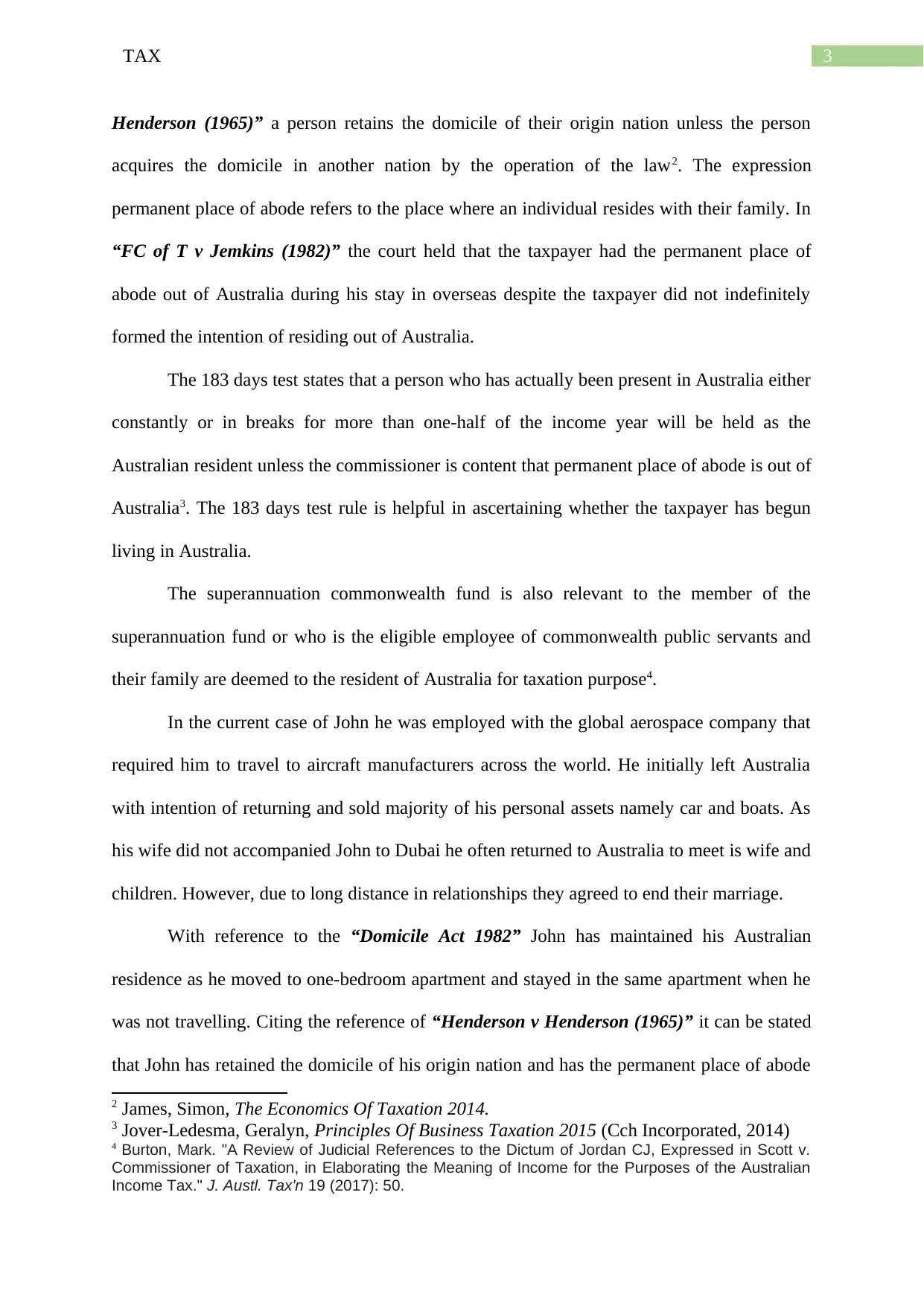
3TAX
Henderson (1965)” a person retains the domicile of their origin nation unless the person
acquires the domicile in another nation by the operation of the law2. The expression
permanent place of abode refers to the place where an individual resides with their family. In
“FC of T v Jemkins (1982)” the court held that the taxpayer had the permanent place of
abode out of Australia during his stay in overseas despite the taxpayer did not indefinitely
formed the intention of residing out of Australia.
The 183 days test states that a person who has actually been present in Australia either
constantly or in breaks for more than one-half of the income year will be held as the
Australian resident unless the commissioner is content that permanent place of abode is out of
Australia3. The 183 days test rule is helpful in ascertaining whether the taxpayer has begun
living in Australia.
The superannuation commonwealth fund is also relevant to the member of the
superannuation fund or who is the eligible employee of commonwealth public servants and
their family are deemed to the resident of Australia for taxation purpose4.
In the current case of John he was employed with the global aerospace company that
required him to travel to aircraft manufacturers across the world. He initially left Australia
with intention of returning and sold majority of his personal assets namely car and boats. As
his wife did not accompanied John to Dubai he often returned to Australia to meet is wife and
children. However, due to long distance in relationships they agreed to end their marriage.
With reference to the “Domicile Act 1982” John has maintained his Australian
residence as he moved to one-bedroom apartment and stayed in the same apartment when he
was not travelling. Citing the reference of “Henderson v Henderson (1965)” it can be stated
that John has retained the domicile of his origin nation and has the permanent place of abode
2 James, Simon, The Economics Of Taxation 2014.
3 Jover-Ledesma, Geralyn, Principles Of Business Taxation 2015 (Cch Incorporated, 2014)
4 Burton, Mark. "A Review of Judicial References to the Dictum of Jordan CJ, Expressed in Scott v.
Commissioner of Taxation, in Elaborating the Meaning of Income for the Purposes of the Australian
Income Tax." J. Austl. Tax'n 19 (2017): 50.
Henderson (1965)” a person retains the domicile of their origin nation unless the person
acquires the domicile in another nation by the operation of the law2. The expression
permanent place of abode refers to the place where an individual resides with their family. In
“FC of T v Jemkins (1982)” the court held that the taxpayer had the permanent place of
abode out of Australia during his stay in overseas despite the taxpayer did not indefinitely
formed the intention of residing out of Australia.
The 183 days test states that a person who has actually been present in Australia either
constantly or in breaks for more than one-half of the income year will be held as the
Australian resident unless the commissioner is content that permanent place of abode is out of
Australia3. The 183 days test rule is helpful in ascertaining whether the taxpayer has begun
living in Australia.
The superannuation commonwealth fund is also relevant to the member of the
superannuation fund or who is the eligible employee of commonwealth public servants and
their family are deemed to the resident of Australia for taxation purpose4.
In the current case of John he was employed with the global aerospace company that
required him to travel to aircraft manufacturers across the world. He initially left Australia
with intention of returning and sold majority of his personal assets namely car and boats. As
his wife did not accompanied John to Dubai he often returned to Australia to meet is wife and
children. However, due to long distance in relationships they agreed to end their marriage.
With reference to the “Domicile Act 1982” John has maintained his Australian
residence as he moved to one-bedroom apartment and stayed in the same apartment when he
was not travelling. Citing the reference of “Henderson v Henderson (1965)” it can be stated
that John has retained the domicile of his origin nation and has the permanent place of abode
2 James, Simon, The Economics Of Taxation 2014.
3 Jover-Ledesma, Geralyn, Principles Of Business Taxation 2015 (Cch Incorporated, 2014)
4 Burton, Mark. "A Review of Judicial References to the Dictum of Jordan CJ, Expressed in Scott v.
Commissioner of Taxation, in Elaborating the Meaning of Income for the Purposes of the Australian
Income Tax." J. Austl. Tax'n 19 (2017): 50.
Paraphrase This Document
Need a fresh take? Get an instant paraphrase of this document with our AI Paraphraser
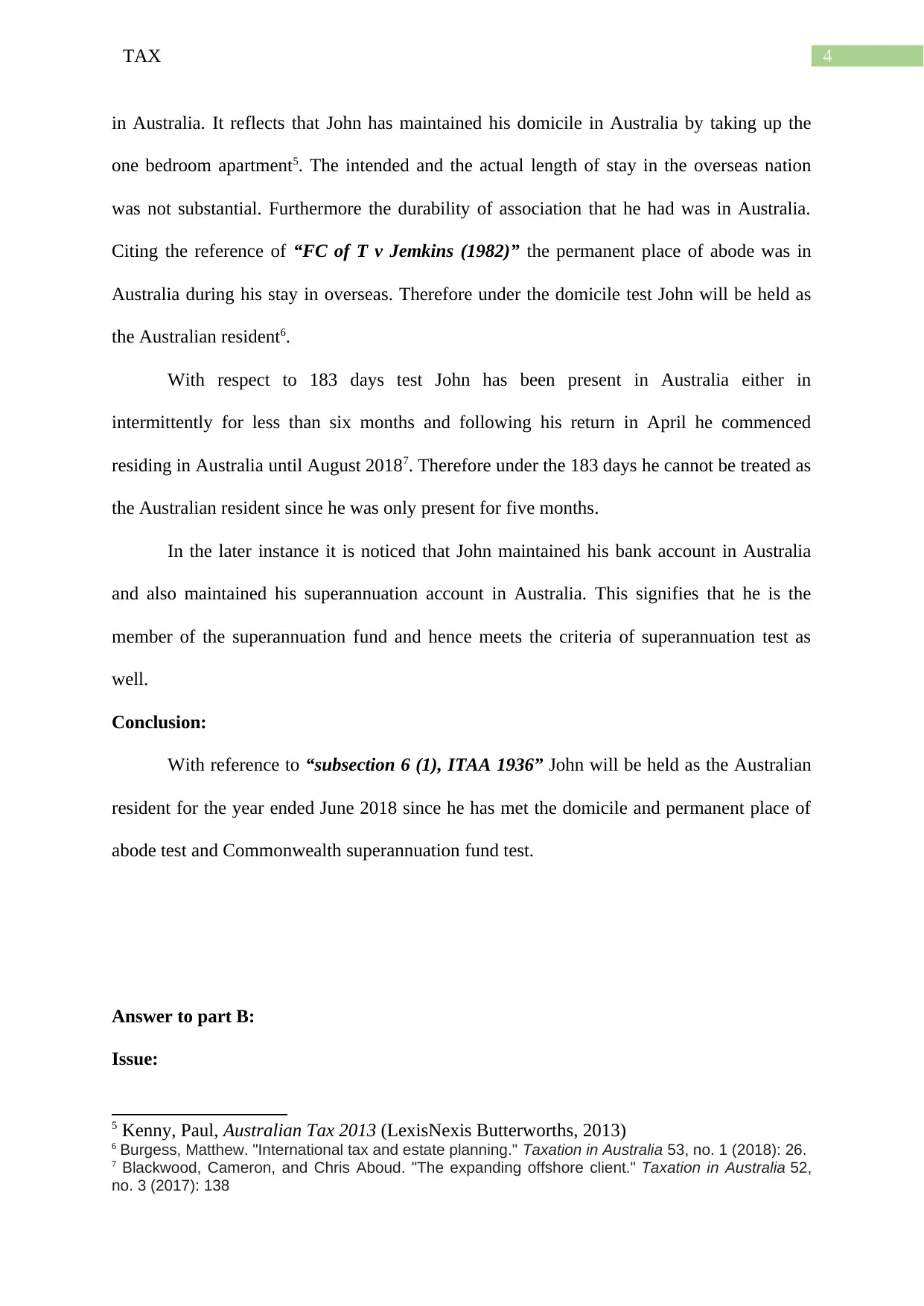
4TAX
in Australia. It reflects that John has maintained his domicile in Australia by taking up the
one bedroom apartment5. The intended and the actual length of stay in the overseas nation
was not substantial. Furthermore the durability of association that he had was in Australia.
Citing the reference of “FC of T v Jemkins (1982)” the permanent place of abode was in
Australia during his stay in overseas. Therefore under the domicile test John will be held as
the Australian resident6.
With respect to 183 days test John has been present in Australia either in
intermittently for less than six months and following his return in April he commenced
residing in Australia until August 20187. Therefore under the 183 days he cannot be treated as
the Australian resident since he was only present for five months.
In the later instance it is noticed that John maintained his bank account in Australia
and also maintained his superannuation account in Australia. This signifies that he is the
member of the superannuation fund and hence meets the criteria of superannuation test as
well.
Conclusion:
With reference to “subsection 6 (1), ITAA 1936” John will be held as the Australian
resident for the year ended June 2018 since he has met the domicile and permanent place of
abode test and Commonwealth superannuation fund test.
Answer to part B:
Issue:
5 Kenny, Paul, Australian Tax 2013 (LexisNexis Butterworths, 2013)
6 Burgess, Matthew. "International tax and estate planning." Taxation in Australia 53, no. 1 (2018): 26.
7 Blackwood, Cameron, and Chris Aboud. "The expanding offshore client." Taxation in Australia 52,
no. 3 (2017): 138
in Australia. It reflects that John has maintained his domicile in Australia by taking up the
one bedroom apartment5. The intended and the actual length of stay in the overseas nation
was not substantial. Furthermore the durability of association that he had was in Australia.
Citing the reference of “FC of T v Jemkins (1982)” the permanent place of abode was in
Australia during his stay in overseas. Therefore under the domicile test John will be held as
the Australian resident6.
With respect to 183 days test John has been present in Australia either in
intermittently for less than six months and following his return in April he commenced
residing in Australia until August 20187. Therefore under the 183 days he cannot be treated as
the Australian resident since he was only present for five months.
In the later instance it is noticed that John maintained his bank account in Australia
and also maintained his superannuation account in Australia. This signifies that he is the
member of the superannuation fund and hence meets the criteria of superannuation test as
well.
Conclusion:
With reference to “subsection 6 (1), ITAA 1936” John will be held as the Australian
resident for the year ended June 2018 since he has met the domicile and permanent place of
abode test and Commonwealth superannuation fund test.
Answer to part B:
Issue:
5 Kenny, Paul, Australian Tax 2013 (LexisNexis Butterworths, 2013)
6 Burgess, Matthew. "International tax and estate planning." Taxation in Australia 53, no. 1 (2018): 26.
7 Blackwood, Cameron, and Chris Aboud. "The expanding offshore client." Taxation in Australia 52,
no. 3 (2017): 138
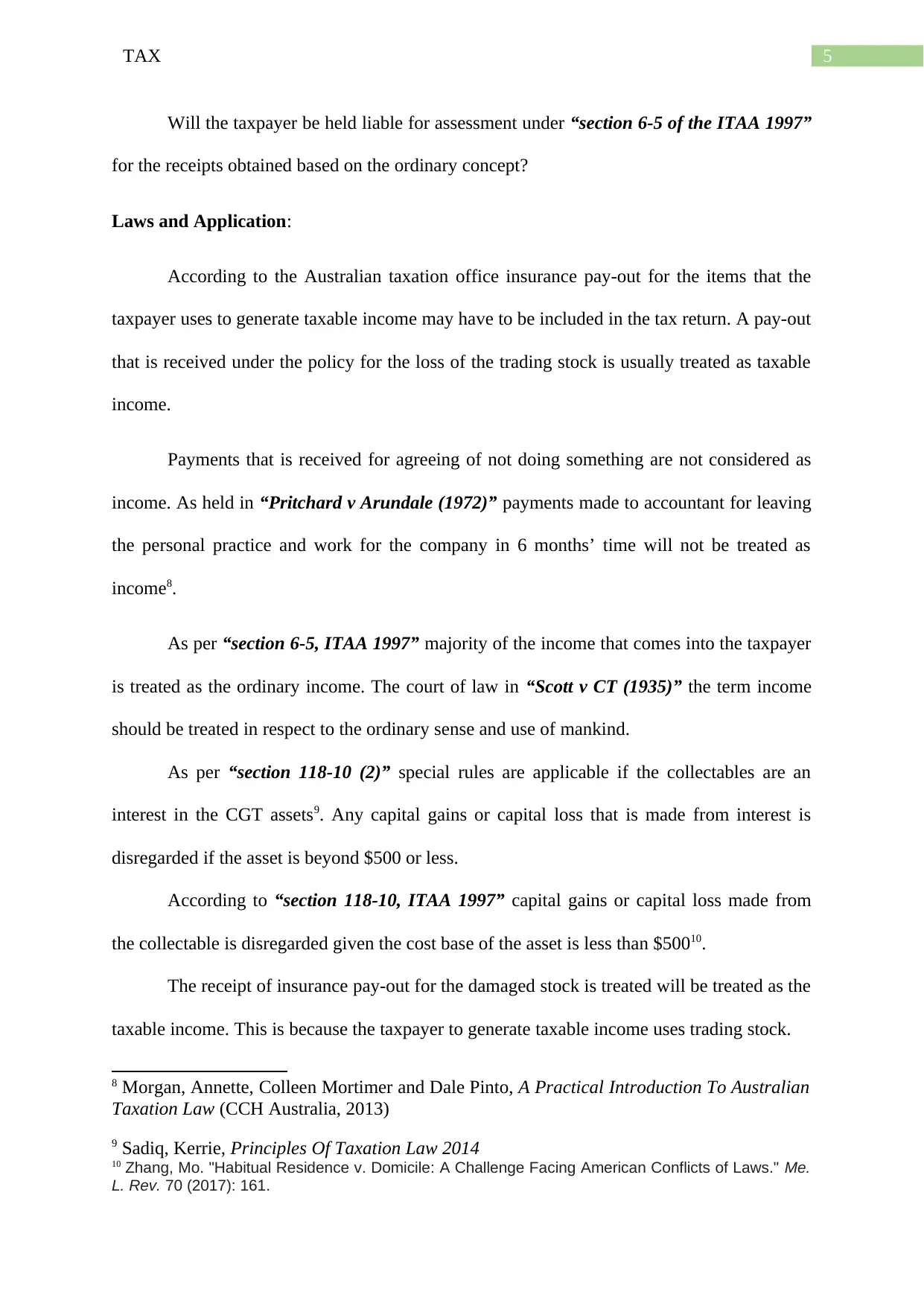
5TAX
Will the taxpayer be held liable for assessment under “section 6-5 of the ITAA 1997”
for the receipts obtained based on the ordinary concept?
Laws and Application:
According to the Australian taxation office insurance pay-out for the items that the
taxpayer uses to generate taxable income may have to be included in the tax return. A pay-out
that is received under the policy for the loss of the trading stock is usually treated as taxable
income.
Payments that is received for agreeing of not doing something are not considered as
income. As held in “Pritchard v Arundale (1972)” payments made to accountant for leaving
the personal practice and work for the company in 6 months’ time will not be treated as
income8.
As per “section 6-5, ITAA 1997” majority of the income that comes into the taxpayer
is treated as the ordinary income. The court of law in “Scott v CT (1935)” the term income
should be treated in respect to the ordinary sense and use of mankind.
As per “section 118-10 (2)” special rules are applicable if the collectables are an
interest in the CGT assets9. Any capital gains or capital loss that is made from interest is
disregarded if the asset is beyond $500 or less.
According to “section 118-10, ITAA 1997” capital gains or capital loss made from
the collectable is disregarded given the cost base of the asset is less than $50010.
The receipt of insurance pay-out for the damaged stock is treated will be treated as the
taxable income. This is because the taxpayer to generate taxable income uses trading stock.
8 Morgan, Annette, Colleen Mortimer and Dale Pinto, A Practical Introduction To Australian
Taxation Law (CCH Australia, 2013)
9 Sadiq, Kerrie, Principles Of Taxation Law 2014
10 Zhang, Mo. "Habitual Residence v. Domicile: A Challenge Facing American Conflicts of Laws." Me.
L. Rev. 70 (2017): 161.
Will the taxpayer be held liable for assessment under “section 6-5 of the ITAA 1997”
for the receipts obtained based on the ordinary concept?
Laws and Application:
According to the Australian taxation office insurance pay-out for the items that the
taxpayer uses to generate taxable income may have to be included in the tax return. A pay-out
that is received under the policy for the loss of the trading stock is usually treated as taxable
income.
Payments that is received for agreeing of not doing something are not considered as
income. As held in “Pritchard v Arundale (1972)” payments made to accountant for leaving
the personal practice and work for the company in 6 months’ time will not be treated as
income8.
As per “section 6-5, ITAA 1997” majority of the income that comes into the taxpayer
is treated as the ordinary income. The court of law in “Scott v CT (1935)” the term income
should be treated in respect to the ordinary sense and use of mankind.
As per “section 118-10 (2)” special rules are applicable if the collectables are an
interest in the CGT assets9. Any capital gains or capital loss that is made from interest is
disregarded if the asset is beyond $500 or less.
According to “section 118-10, ITAA 1997” capital gains or capital loss made from
the collectable is disregarded given the cost base of the asset is less than $50010.
The receipt of insurance pay-out for the damaged stock is treated will be treated as the
taxable income. This is because the taxpayer to generate taxable income uses trading stock.
8 Morgan, Annette, Colleen Mortimer and Dale Pinto, A Practical Introduction To Australian
Taxation Law (CCH Australia, 2013)
9 Sadiq, Kerrie, Principles Of Taxation Law 2014
10 Zhang, Mo. "Habitual Residence v. Domicile: A Challenge Facing American Conflicts of Laws." Me.
L. Rev. 70 (2017): 161.
⊘ This is a preview!⊘
Do you want full access?
Subscribe today to unlock all pages.

Trusted by 1+ million students worldwide
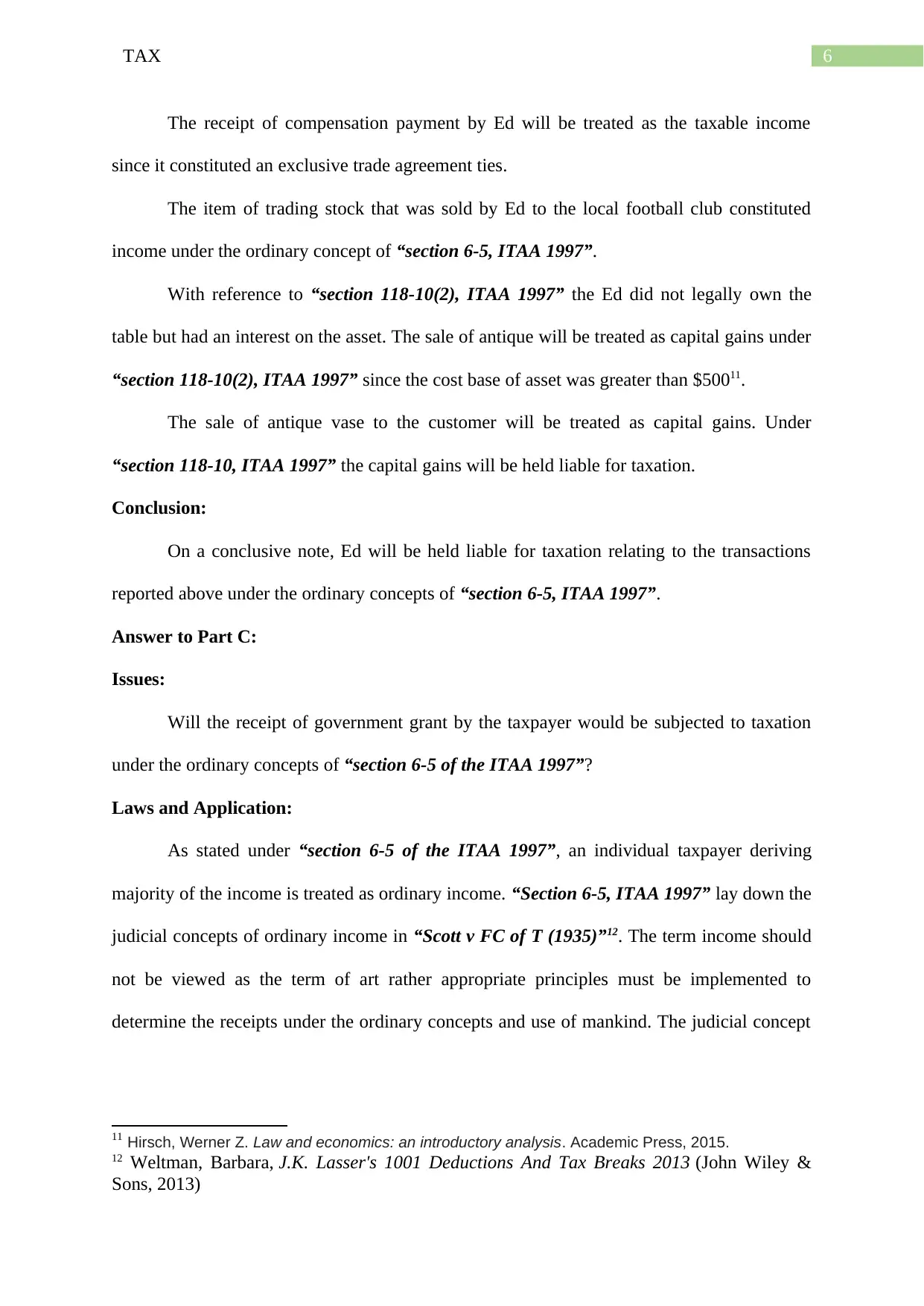
6TAX
The receipt of compensation payment by Ed will be treated as the taxable income
since it constituted an exclusive trade agreement ties.
The item of trading stock that was sold by Ed to the local football club constituted
income under the ordinary concept of “section 6-5, ITAA 1997”.
With reference to “section 118-10(2), ITAA 1997” the Ed did not legally own the
table but had an interest on the asset. The sale of antique will be treated as capital gains under
“section 118-10(2), ITAA 1997” since the cost base of asset was greater than $50011.
The sale of antique vase to the customer will be treated as capital gains. Under
“section 118-10, ITAA 1997” the capital gains will be held liable for taxation.
Conclusion:
On a conclusive note, Ed will be held liable for taxation relating to the transactions
reported above under the ordinary concepts of “section 6-5, ITAA 1997”.
Answer to Part C:
Issues:
Will the receipt of government grant by the taxpayer would be subjected to taxation
under the ordinary concepts of “section 6-5 of the ITAA 1997”?
Laws and Application:
As stated under “section 6-5 of the ITAA 1997”, an individual taxpayer deriving
majority of the income is treated as ordinary income. “Section 6-5, ITAA 1997” lay down the
judicial concepts of ordinary income in “Scott v FC of T (1935)”12. The term income should
not be viewed as the term of art rather appropriate principles must be implemented to
determine the receipts under the ordinary concepts and use of mankind. The judicial concept
11 Hirsch, Werner Z. Law and economics: an introductory analysis. Academic Press, 2015.
12 Weltman, Barbara, J.K. Lasser's 1001 Deductions And Tax Breaks 2013 (John Wiley &
Sons, 2013)
The receipt of compensation payment by Ed will be treated as the taxable income
since it constituted an exclusive trade agreement ties.
The item of trading stock that was sold by Ed to the local football club constituted
income under the ordinary concept of “section 6-5, ITAA 1997”.
With reference to “section 118-10(2), ITAA 1997” the Ed did not legally own the
table but had an interest on the asset. The sale of antique will be treated as capital gains under
“section 118-10(2), ITAA 1997” since the cost base of asset was greater than $50011.
The sale of antique vase to the customer will be treated as capital gains. Under
“section 118-10, ITAA 1997” the capital gains will be held liable for taxation.
Conclusion:
On a conclusive note, Ed will be held liable for taxation relating to the transactions
reported above under the ordinary concepts of “section 6-5, ITAA 1997”.
Answer to Part C:
Issues:
Will the receipt of government grant by the taxpayer would be subjected to taxation
under the ordinary concepts of “section 6-5 of the ITAA 1997”?
Laws and Application:
As stated under “section 6-5 of the ITAA 1997”, an individual taxpayer deriving
majority of the income is treated as ordinary income. “Section 6-5, ITAA 1997” lay down the
judicial concepts of ordinary income in “Scott v FC of T (1935)”12. The term income should
not be viewed as the term of art rather appropriate principles must be implemented to
determine the receipts under the ordinary concepts and use of mankind. The judicial concept
11 Hirsch, Werner Z. Law and economics: an introductory analysis. Academic Press, 2015.
12 Weltman, Barbara, J.K. Lasser's 1001 Deductions And Tax Breaks 2013 (John Wiley &
Sons, 2013)
Paraphrase This Document
Need a fresh take? Get an instant paraphrase of this document with our AI Paraphraser
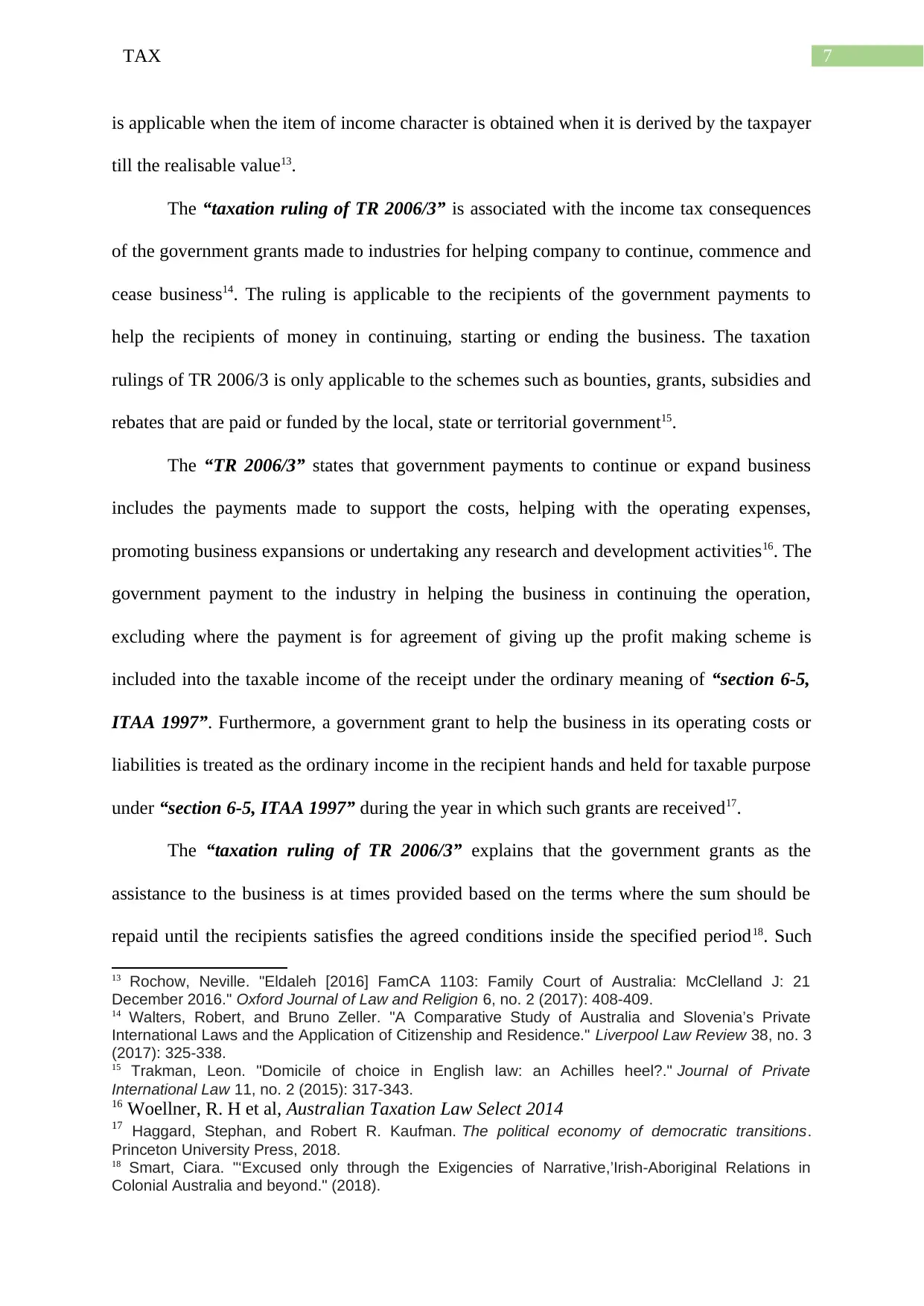
7TAX
is applicable when the item of income character is obtained when it is derived by the taxpayer
till the realisable value13.
The “taxation ruling of TR 2006/3” is associated with the income tax consequences
of the government grants made to industries for helping company to continue, commence and
cease business14. The ruling is applicable to the recipients of the government payments to
help the recipients of money in continuing, starting or ending the business. The taxation
rulings of TR 2006/3 is only applicable to the schemes such as bounties, grants, subsidies and
rebates that are paid or funded by the local, state or territorial government15.
The “TR 2006/3” states that government payments to continue or expand business
includes the payments made to support the costs, helping with the operating expenses,
promoting business expansions or undertaking any research and development activities16. The
government payment to the industry in helping the business in continuing the operation,
excluding where the payment is for agreement of giving up the profit making scheme is
included into the taxable income of the receipt under the ordinary meaning of “section 6-5,
ITAA 1997”. Furthermore, a government grant to help the business in its operating costs or
liabilities is treated as the ordinary income in the recipient hands and held for taxable purpose
under “section 6-5, ITAA 1997” during the year in which such grants are received17.
The “taxation ruling of TR 2006/3” explains that the government grants as the
assistance to the business is at times provided based on the terms where the sum should be
repaid until the recipients satisfies the agreed conditions inside the specified period18. Such
13 Rochow, Neville. "Eldaleh [2016] FamCA 1103: Family Court of Australia: McClelland J: 21
December 2016." Oxford Journal of Law and Religion 6, no. 2 (2017): 408-409.
14 Walters, Robert, and Bruno Zeller. "A Comparative Study of Australia and Slovenia’s Private
International Laws and the Application of Citizenship and Residence." Liverpool Law Review 38, no. 3
(2017): 325-338.
15 Trakman, Leon. "Domicile of choice in English law: an Achilles heel?." Journal of Private
International Law 11, no. 2 (2015): 317-343.
16 Woellner, R. H et al, Australian Taxation Law Select 2014
17 Haggard, Stephan, and Robert R. Kaufman. The political economy of democratic transitions.
Princeton University Press, 2018.
18 Smart, Ciara. "‘Excused only through the Exigencies of Narrative,’Irish-Aboriginal Relations in
Colonial Australia and beyond." (2018).
is applicable when the item of income character is obtained when it is derived by the taxpayer
till the realisable value13.
The “taxation ruling of TR 2006/3” is associated with the income tax consequences
of the government grants made to industries for helping company to continue, commence and
cease business14. The ruling is applicable to the recipients of the government payments to
help the recipients of money in continuing, starting or ending the business. The taxation
rulings of TR 2006/3 is only applicable to the schemes such as bounties, grants, subsidies and
rebates that are paid or funded by the local, state or territorial government15.
The “TR 2006/3” states that government payments to continue or expand business
includes the payments made to support the costs, helping with the operating expenses,
promoting business expansions or undertaking any research and development activities16. The
government payment to the industry in helping the business in continuing the operation,
excluding where the payment is for agreement of giving up the profit making scheme is
included into the taxable income of the receipt under the ordinary meaning of “section 6-5,
ITAA 1997”. Furthermore, a government grant to help the business in its operating costs or
liabilities is treated as the ordinary income in the recipient hands and held for taxable purpose
under “section 6-5, ITAA 1997” during the year in which such grants are received17.
The “taxation ruling of TR 2006/3” explains that the government grants as the
assistance to the business is at times provided based on the terms where the sum should be
repaid until the recipients satisfies the agreed conditions inside the specified period18. Such
13 Rochow, Neville. "Eldaleh [2016] FamCA 1103: Family Court of Australia: McClelland J: 21
December 2016." Oxford Journal of Law and Religion 6, no. 2 (2017): 408-409.
14 Walters, Robert, and Bruno Zeller. "A Comparative Study of Australia and Slovenia’s Private
International Laws and the Application of Citizenship and Residence." Liverpool Law Review 38, no. 3
(2017): 325-338.
15 Trakman, Leon. "Domicile of choice in English law: an Achilles heel?." Journal of Private
International Law 11, no. 2 (2015): 317-343.
16 Woellner, R. H et al, Australian Taxation Law Select 2014
17 Haggard, Stephan, and Robert R. Kaufman. The political economy of democratic transitions.
Princeton University Press, 2018.
18 Smart, Ciara. "‘Excused only through the Exigencies of Narrative,’Irish-Aboriginal Relations in
Colonial Australia and beyond." (2018).
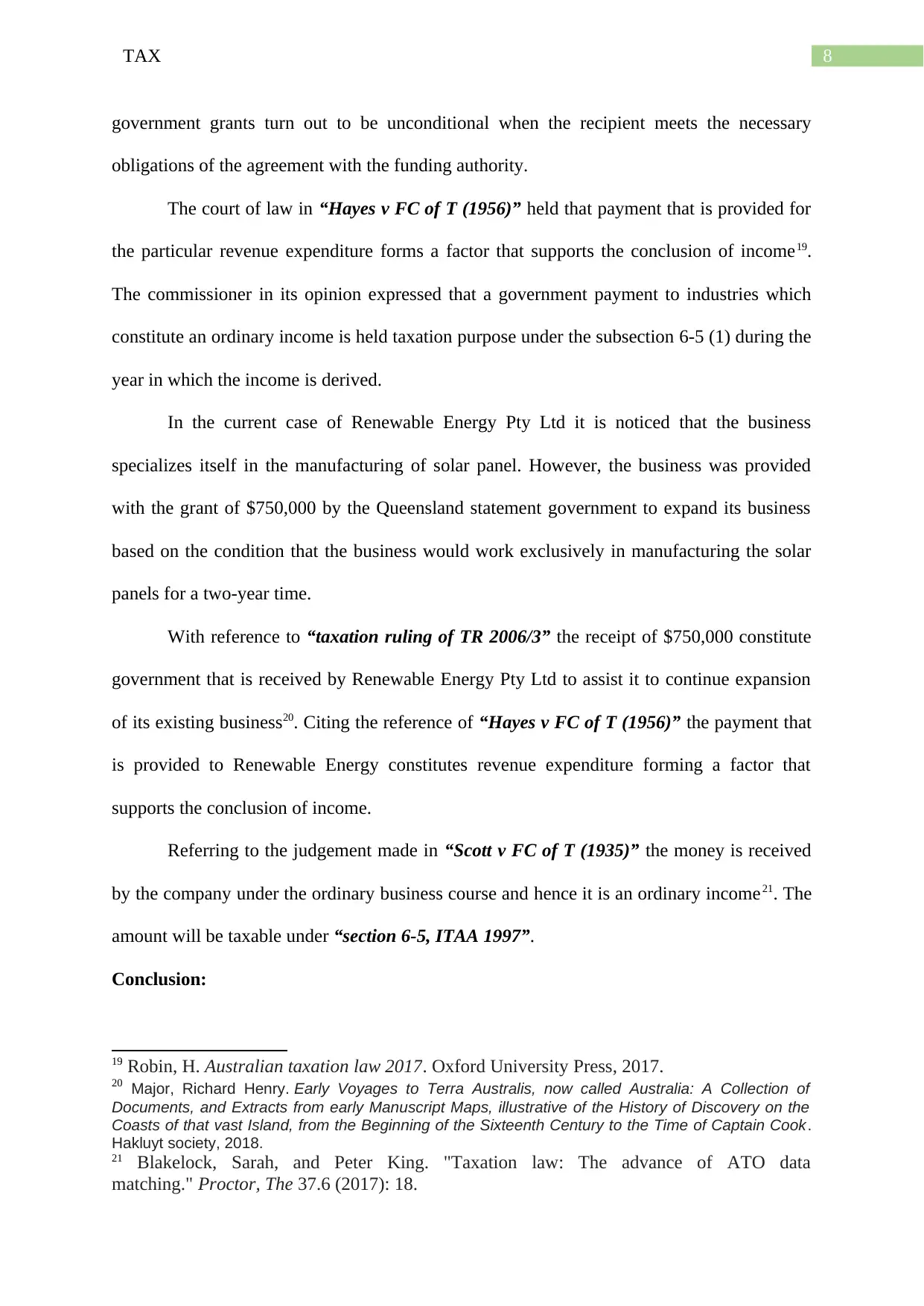
8TAX
government grants turn out to be unconditional when the recipient meets the necessary
obligations of the agreement with the funding authority.
The court of law in “Hayes v FC of T (1956)” held that payment that is provided for
the particular revenue expenditure forms a factor that supports the conclusion of income19.
The commissioner in its opinion expressed that a government payment to industries which
constitute an ordinary income is held taxation purpose under the subsection 6-5 (1) during the
year in which the income is derived.
In the current case of Renewable Energy Pty Ltd it is noticed that the business
specializes itself in the manufacturing of solar panel. However, the business was provided
with the grant of $750,000 by the Queensland statement government to expand its business
based on the condition that the business would work exclusively in manufacturing the solar
panels for a two-year time.
With reference to “taxation ruling of TR 2006/3” the receipt of $750,000 constitute
government that is received by Renewable Energy Pty Ltd to assist it to continue expansion
of its existing business20. Citing the reference of “Hayes v FC of T (1956)” the payment that
is provided to Renewable Energy constitutes revenue expenditure forming a factor that
supports the conclusion of income.
Referring to the judgement made in “Scott v FC of T (1935)” the money is received
by the company under the ordinary business course and hence it is an ordinary income21. The
amount will be taxable under “section 6-5, ITAA 1997”.
Conclusion:
19 Robin, H. Australian taxation law 2017. Oxford University Press, 2017.
20 Major, Richard Henry. Early Voyages to Terra Australis, now called Australia: A Collection of
Documents, and Extracts from early Manuscript Maps, illustrative of the History of Discovery on the
Coasts of that vast Island, from the Beginning of the Sixteenth Century to the Time of Captain Cook.
Hakluyt society, 2018.
21 Blakelock, Sarah, and Peter King. "Taxation law: The advance of ATO data
matching." Proctor, The 37.6 (2017): 18.
government grants turn out to be unconditional when the recipient meets the necessary
obligations of the agreement with the funding authority.
The court of law in “Hayes v FC of T (1956)” held that payment that is provided for
the particular revenue expenditure forms a factor that supports the conclusion of income19.
The commissioner in its opinion expressed that a government payment to industries which
constitute an ordinary income is held taxation purpose under the subsection 6-5 (1) during the
year in which the income is derived.
In the current case of Renewable Energy Pty Ltd it is noticed that the business
specializes itself in the manufacturing of solar panel. However, the business was provided
with the grant of $750,000 by the Queensland statement government to expand its business
based on the condition that the business would work exclusively in manufacturing the solar
panels for a two-year time.
With reference to “taxation ruling of TR 2006/3” the receipt of $750,000 constitute
government that is received by Renewable Energy Pty Ltd to assist it to continue expansion
of its existing business20. Citing the reference of “Hayes v FC of T (1956)” the payment that
is provided to Renewable Energy constitutes revenue expenditure forming a factor that
supports the conclusion of income.
Referring to the judgement made in “Scott v FC of T (1935)” the money is received
by the company under the ordinary business course and hence it is an ordinary income21. The
amount will be taxable under “section 6-5, ITAA 1997”.
Conclusion:
19 Robin, H. Australian taxation law 2017. Oxford University Press, 2017.
20 Major, Richard Henry. Early Voyages to Terra Australis, now called Australia: A Collection of
Documents, and Extracts from early Manuscript Maps, illustrative of the History of Discovery on the
Coasts of that vast Island, from the Beginning of the Sixteenth Century to the Time of Captain Cook.
Hakluyt society, 2018.
21 Blakelock, Sarah, and Peter King. "Taxation law: The advance of ATO data
matching." Proctor, The 37.6 (2017): 18.
⊘ This is a preview!⊘
Do you want full access?
Subscribe today to unlock all pages.

Trusted by 1+ million students worldwide
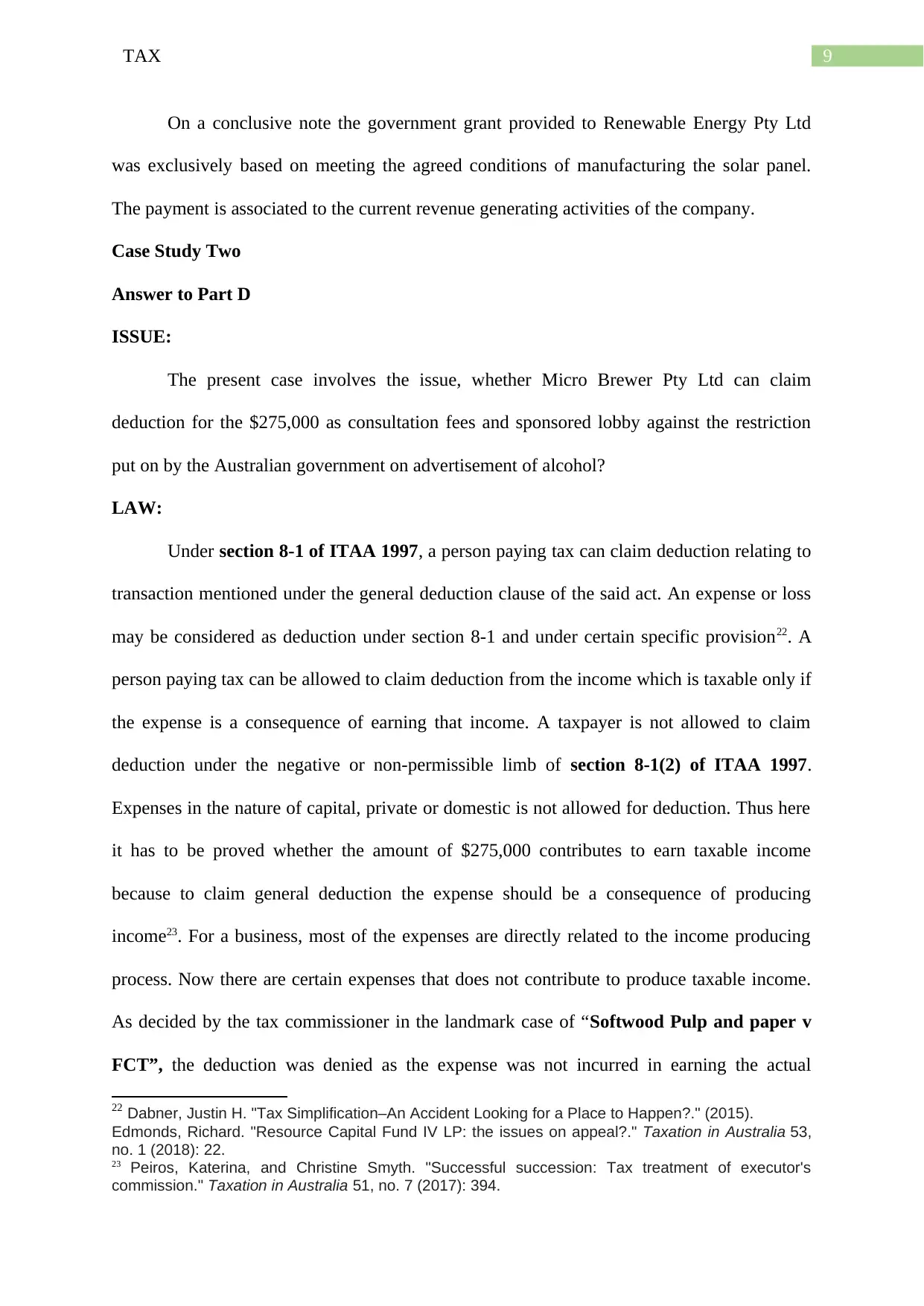
9TAX
On a conclusive note the government grant provided to Renewable Energy Pty Ltd
was exclusively based on meeting the agreed conditions of manufacturing the solar panel.
The payment is associated to the current revenue generating activities of the company.
Case Study Two
Answer to Part D
ISSUE:
The present case involves the issue, whether Micro Brewer Pty Ltd can claim
deduction for the $275,000 as consultation fees and sponsored lobby against the restriction
put on by the Australian government on advertisement of alcohol?
LAW:
Under section 8-1 of ITAA 1997, a person paying tax can claim deduction relating to
transaction mentioned under the general deduction clause of the said act. An expense or loss
may be considered as deduction under section 8-1 and under certain specific provision22. A
person paying tax can be allowed to claim deduction from the income which is taxable only if
the expense is a consequence of earning that income. A taxpayer is not allowed to claim
deduction under the negative or non-permissible limb of section 8-1(2) of ITAA 1997.
Expenses in the nature of capital, private or domestic is not allowed for deduction. Thus here
it has to be proved whether the amount of $275,000 contributes to earn taxable income
because to claim general deduction the expense should be a consequence of producing
income23. For a business, most of the expenses are directly related to the income producing
process. Now there are certain expenses that does not contribute to produce taxable income.
As decided by the tax commissioner in the landmark case of “Softwood Pulp and paper v
FCT”, the deduction was denied as the expense was not incurred in earning the actual
22 Dabner, Justin H. "Tax Simplification–An Accident Looking for a Place to Happen?." (2015).
Edmonds, Richard. "Resource Capital Fund IV LP: the issues on appeal?." Taxation in Australia 53,
no. 1 (2018): 22.
23 Peiros, Katerina, and Christine Smyth. "Successful succession: Tax treatment of executor's
commission." Taxation in Australia 51, no. 7 (2017): 394.
On a conclusive note the government grant provided to Renewable Energy Pty Ltd
was exclusively based on meeting the agreed conditions of manufacturing the solar panel.
The payment is associated to the current revenue generating activities of the company.
Case Study Two
Answer to Part D
ISSUE:
The present case involves the issue, whether Micro Brewer Pty Ltd can claim
deduction for the $275,000 as consultation fees and sponsored lobby against the restriction
put on by the Australian government on advertisement of alcohol?
LAW:
Under section 8-1 of ITAA 1997, a person paying tax can claim deduction relating to
transaction mentioned under the general deduction clause of the said act. An expense or loss
may be considered as deduction under section 8-1 and under certain specific provision22. A
person paying tax can be allowed to claim deduction from the income which is taxable only if
the expense is a consequence of earning that income. A taxpayer is not allowed to claim
deduction under the negative or non-permissible limb of section 8-1(2) of ITAA 1997.
Expenses in the nature of capital, private or domestic is not allowed for deduction. Thus here
it has to be proved whether the amount of $275,000 contributes to earn taxable income
because to claim general deduction the expense should be a consequence of producing
income23. For a business, most of the expenses are directly related to the income producing
process. Now there are certain expenses that does not contribute to produce taxable income.
As decided by the tax commissioner in the landmark case of “Softwood Pulp and paper v
FCT”, the deduction was denied as the expense was not incurred in earning the actual
22 Dabner, Justin H. "Tax Simplification–An Accident Looking for a Place to Happen?." (2015).
Edmonds, Richard. "Resource Capital Fund IV LP: the issues on appeal?." Taxation in Australia 53,
no. 1 (2018): 22.
23 Peiros, Katerina, and Christine Smyth. "Successful succession: Tax treatment of executor's
commission." Taxation in Australia 51, no. 7 (2017): 394.
Paraphrase This Document
Need a fresh take? Get an instant paraphrase of this document with our AI Paraphraser
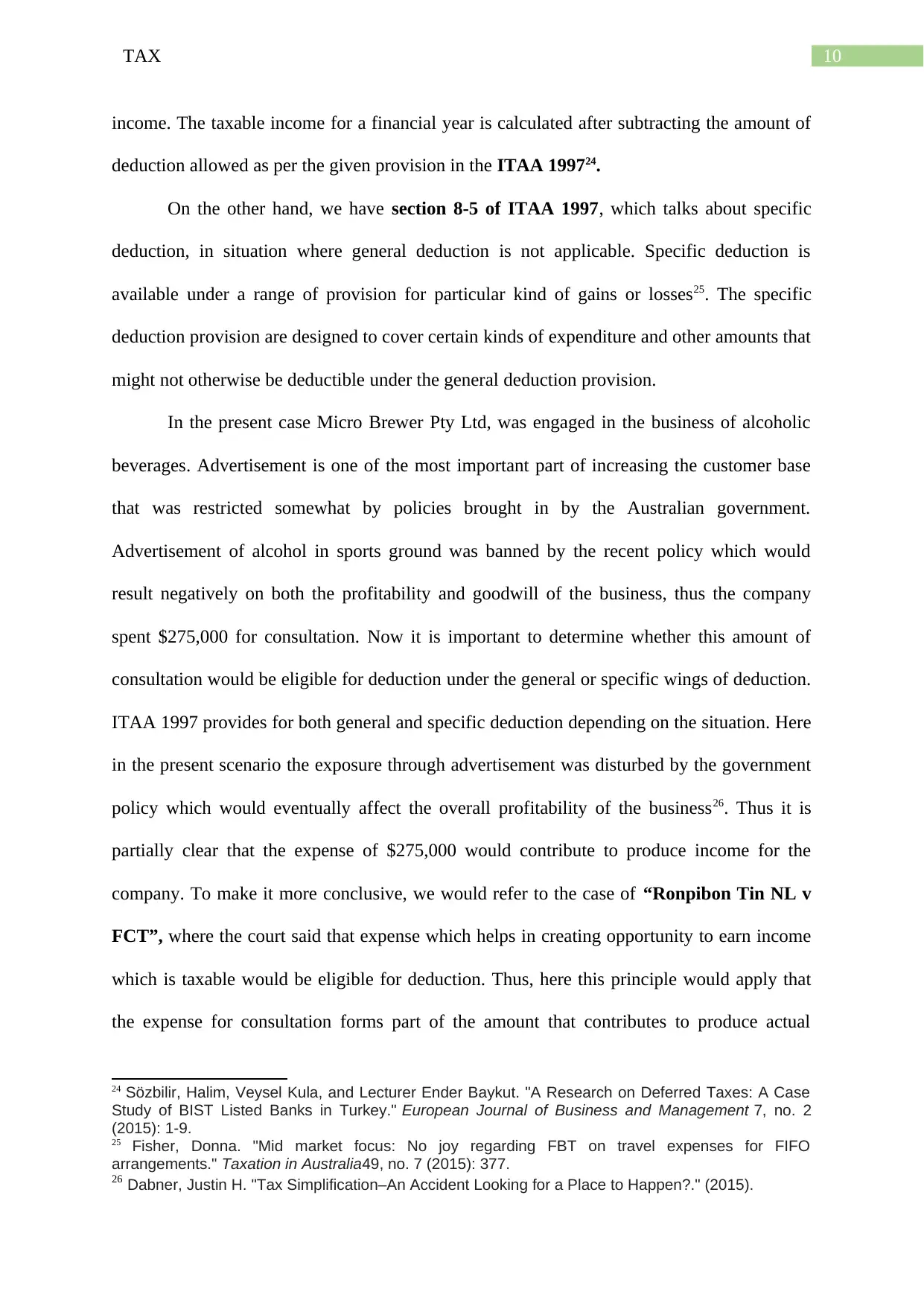
10TAX
income. The taxable income for a financial year is calculated after subtracting the amount of
deduction allowed as per the given provision in the ITAA 199724.
On the other hand, we have section 8-5 of ITAA 1997, which talks about specific
deduction, in situation where general deduction is not applicable. Specific deduction is
available under a range of provision for particular kind of gains or losses25. The specific
deduction provision are designed to cover certain kinds of expenditure and other amounts that
might not otherwise be deductible under the general deduction provision.
In the present case Micro Brewer Pty Ltd, was engaged in the business of alcoholic
beverages. Advertisement is one of the most important part of increasing the customer base
that was restricted somewhat by policies brought in by the Australian government.
Advertisement of alcohol in sports ground was banned by the recent policy which would
result negatively on both the profitability and goodwill of the business, thus the company
spent $275,000 for consultation. Now it is important to determine whether this amount of
consultation would be eligible for deduction under the general or specific wings of deduction.
ITAA 1997 provides for both general and specific deduction depending on the situation. Here
in the present scenario the exposure through advertisement was disturbed by the government
policy which would eventually affect the overall profitability of the business26. Thus it is
partially clear that the expense of $275,000 would contribute to produce income for the
company. To make it more conclusive, we would refer to the case of “Ronpibon Tin NL v
FCT”, where the court said that expense which helps in creating opportunity to earn income
which is taxable would be eligible for deduction. Thus, here this principle would apply that
the expense for consultation forms part of the amount that contributes to produce actual
24 Sözbilir, Halim, Veysel Kula, and Lecturer Ender Baykut. "A Research on Deferred Taxes: A Case
Study of BIST Listed Banks in Turkey." European Journal of Business and Management 7, no. 2
(2015): 1-9.
25 Fisher, Donna. "Mid market focus: No joy regarding FBT on travel expenses for FIFO
arrangements." Taxation in Australia49, no. 7 (2015): 377.
26 Dabner, Justin H. "Tax Simplification–An Accident Looking for a Place to Happen?." (2015).
income. The taxable income for a financial year is calculated after subtracting the amount of
deduction allowed as per the given provision in the ITAA 199724.
On the other hand, we have section 8-5 of ITAA 1997, which talks about specific
deduction, in situation where general deduction is not applicable. Specific deduction is
available under a range of provision for particular kind of gains or losses25. The specific
deduction provision are designed to cover certain kinds of expenditure and other amounts that
might not otherwise be deductible under the general deduction provision.
In the present case Micro Brewer Pty Ltd, was engaged in the business of alcoholic
beverages. Advertisement is one of the most important part of increasing the customer base
that was restricted somewhat by policies brought in by the Australian government.
Advertisement of alcohol in sports ground was banned by the recent policy which would
result negatively on both the profitability and goodwill of the business, thus the company
spent $275,000 for consultation. Now it is important to determine whether this amount of
consultation would be eligible for deduction under the general or specific wings of deduction.
ITAA 1997 provides for both general and specific deduction depending on the situation. Here
in the present scenario the exposure through advertisement was disturbed by the government
policy which would eventually affect the overall profitability of the business26. Thus it is
partially clear that the expense of $275,000 would contribute to produce income for the
company. To make it more conclusive, we would refer to the case of “Ronpibon Tin NL v
FCT”, where the court said that expense which helps in creating opportunity to earn income
which is taxable would be eligible for deduction. Thus, here this principle would apply that
the expense for consultation forms part of the amount that contributes to produce actual
24 Sözbilir, Halim, Veysel Kula, and Lecturer Ender Baykut. "A Research on Deferred Taxes: A Case
Study of BIST Listed Banks in Turkey." European Journal of Business and Management 7, no. 2
(2015): 1-9.
25 Fisher, Donna. "Mid market focus: No joy regarding FBT on travel expenses for FIFO
arrangements." Taxation in Australia49, no. 7 (2015): 377.
26 Dabner, Justin H. "Tax Simplification–An Accident Looking for a Place to Happen?." (2015).
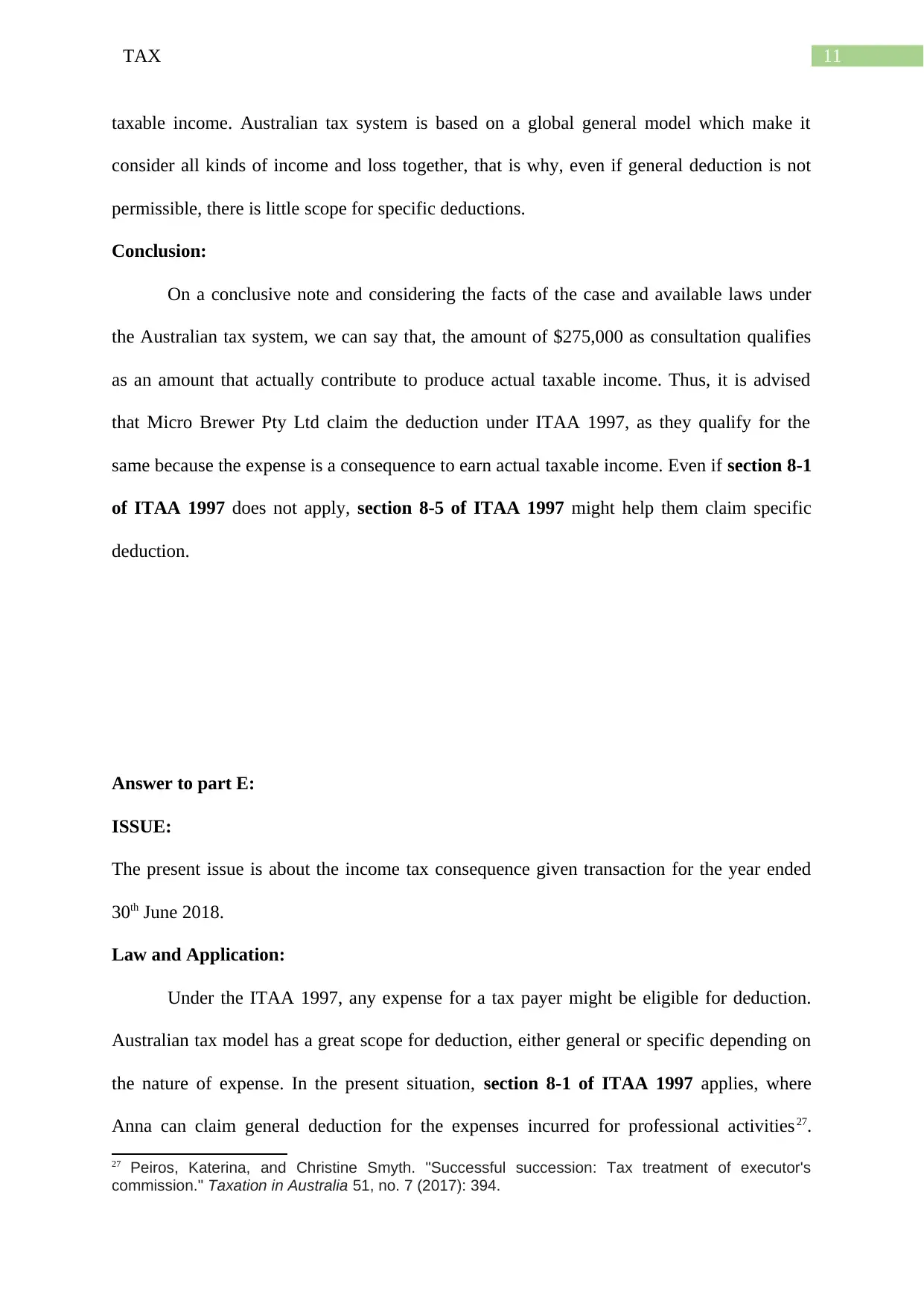
11TAX
taxable income. Australian tax system is based on a global general model which make it
consider all kinds of income and loss together, that is why, even if general deduction is not
permissible, there is little scope for specific deductions.
Conclusion:
On a conclusive note and considering the facts of the case and available laws under
the Australian tax system, we can say that, the amount of $275,000 as consultation qualifies
as an amount that actually contribute to produce actual taxable income. Thus, it is advised
that Micro Brewer Pty Ltd claim the deduction under ITAA 1997, as they qualify for the
same because the expense is a consequence to earn actual taxable income. Even if section 8-1
of ITAA 1997 does not apply, section 8-5 of ITAA 1997 might help them claim specific
deduction.
Answer to part E:
ISSUE:
The present issue is about the income tax consequence given transaction for the year ended
30th June 2018.
Law and Application:
Under the ITAA 1997, any expense for a tax payer might be eligible for deduction.
Australian tax model has a great scope for deduction, either general or specific depending on
the nature of expense. In the present situation, section 8-1 of ITAA 1997 applies, where
Anna can claim general deduction for the expenses incurred for professional activities27.
27 Peiros, Katerina, and Christine Smyth. "Successful succession: Tax treatment of executor's
commission." Taxation in Australia 51, no. 7 (2017): 394.
taxable income. Australian tax system is based on a global general model which make it
consider all kinds of income and loss together, that is why, even if general deduction is not
permissible, there is little scope for specific deductions.
Conclusion:
On a conclusive note and considering the facts of the case and available laws under
the Australian tax system, we can say that, the amount of $275,000 as consultation qualifies
as an amount that actually contribute to produce actual taxable income. Thus, it is advised
that Micro Brewer Pty Ltd claim the deduction under ITAA 1997, as they qualify for the
same because the expense is a consequence to earn actual taxable income. Even if section 8-1
of ITAA 1997 does not apply, section 8-5 of ITAA 1997 might help them claim specific
deduction.
Answer to part E:
ISSUE:
The present issue is about the income tax consequence given transaction for the year ended
30th June 2018.
Law and Application:
Under the ITAA 1997, any expense for a tax payer might be eligible for deduction.
Australian tax model has a great scope for deduction, either general or specific depending on
the nature of expense. In the present situation, section 8-1 of ITAA 1997 applies, where
Anna can claim general deduction for the expenses incurred for professional activities27.
27 Peiros, Katerina, and Christine Smyth. "Successful succession: Tax treatment of executor's
commission." Taxation in Australia 51, no. 7 (2017): 394.
⊘ This is a preview!⊘
Do you want full access?
Subscribe today to unlock all pages.

Trusted by 1+ million students worldwide
1 out of 18
Related Documents
Your All-in-One AI-Powered Toolkit for Academic Success.
+13062052269
info@desklib.com
Available 24*7 on WhatsApp / Email
![[object Object]](/_next/static/media/star-bottom.7253800d.svg)
Unlock your academic potential
Copyright © 2020–2026 A2Z Services. All Rights Reserved. Developed and managed by ZUCOL.




